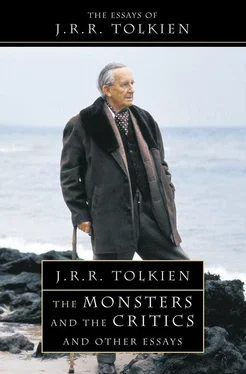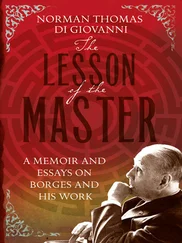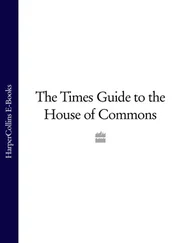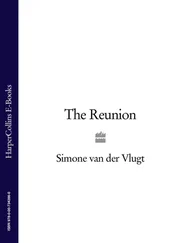The last piece in the book is the Valedictory Address delivered in Oxford on 5 June 1959, at the end of my father’s last term as Merton Professor of English Language and Literature. This has been previously published in J. R. R. Tolkien, Scholar and Storyteller, edited by Mary Salu and Robert T. Farrell, Cornell University Press 1979; but there are many copies of this lecture, and since I made available the text for that volume I have come upon another to which my father made a good many alterations (without in any way changing the argument); these changes are incorporated in the text printed here. Whether they were made before or after the Valedictory Address was delivered I cannot say.
Only in the case of the previously unpublished pieces is this book in any sense an ‘edition’; to those previously published I have added no annotation of any kind, save for a few explanations of detail in the Valedictory Address . The unpublished pieces, being derived from the author’s own texts which are not in altogether final form, are on a different footing, but here also my notes are kept to a minimum and largely restricted to references and textual details.
I wish to thank Rayner Unwin for much help and advice in the planning of the book.
CHRISTOPHER TOLKIEN
BEOWULF: THE MONSTERS AND THE CRITICS
In 1864 the Reverend Oswald Cockayne wrote of the Reverend Doctor Joseph Bosworth, Rawlinsonian Professor of Anglo-Saxon: ‘I have tried to lend to others the conviction I have long entertained that Dr Bosworth is not a man so diligent in his special walk as duly to read the books … which have been printed in our old English, or so-called Anglosaxon tongue. He may do very well for a professor.’ 1These words were inspired by dissatisfaction with Bosworth’s dictionary, and were doubtless unfair. If Bosworth were still alive, a modern Cockayne would probably accuse him of not reading the ‘literature’ of his subject, the books written about the books in the so-called Anglo-Saxon tongue. The original books are nearly buried.
Of none is this so true as of The Beowulf, as it used to be called. I have, of course, read The Beowulf, as have most (but not all) of those who have criticized it. But I fear that, unworthy successor and beneficiary of Joseph Bosworth, I have not been a man so diligent in my special walk as duly to read all that has been printed on, or touching on, this poem. But I have read enough, I think, to venture the opinion that Beowulfiana is, while rich in many departments, specially poor in one. It is poor in criticism, criticism that is directed to the understanding of a poem as a poem. It has been said of Beowulf itself that its weakness lies in placing the unimportant things at the centre and the important on the outer edges. This is one of the opinions that I wish specially to consider. I think it profoundly untrue of the poem, but strikingly true of the literature about it. Beowulf has been used as a quarry of fact and fancy far more assiduously than it has been studied as a work of art.
It is of Beowulf, then, as a poem that I wish to speak; and though it may seem presumption that I should try with swich a lewed mannes wit to pace the wisdom of an heep of lerned men, in this department there is at least more chance for the lewed man. But there is so much that might still be said even under these limitations that I shall confine myself mainly to the monsters – Grendel and the Dragon, as they appear in what seems to me the best and most authoritative general criticism in English – and to certain considerations of the structure and conduct of the poem that arise from this theme.
There is an historical explanation of the state of Beowulfiana that I have referred to. And that explanation is important, if one would venture to criticize the critics. A sketch of the history of the subject is required. But I will here only attempt, for brevity’s sake, to present my view of it allegorically. As it set out upon its adventures among the modern scholars, Beowulf was christened by Wanley Poesis – Poeseos Anglo-Saxonicæ egregium exemplum. But the fairy godmother later invited to superintend its fortunes was Historia. And she brought with her Philologia, Mythologia, Archaeologia, and Laographia. 2Excellent ladies. But where was the child’s name-sake? Poesis was usually forgotten; occasionally admitted by a side-door; sometimes dismissed upon the door-step. ‘ The Beowulf ’, they said, ‘is hardly an affair of yours, and not in any case a protégé that you could be proud of. It is an historical document. Only as such does it interest the superior culture of today.’ And it is as an historical document that it has mainly been examined and dissected. Though ideas as to the nature and quality of the history and information embedded in it have changed much since Thorkelin called it De Danorum Rebus Gestis, this has remained steadily true. In still recent pronouncements this view is explicit. In 1925 Professor Archibald Strong translated Beowulf into verse; 3but in 1921 he had declared: ‘Beowulf is the picture of a whole civilization, of the Germania which Tacitus describes. The main interest which the poem has for us is thus not a purely literary interest. Beowulf is an important historical document.’ 4
I make this preliminary point, because it seems to me that the air has been clouded not only for Strong, but for other more authoritative critics, by the dust of the quarrying researchers. It may well be asked: why should we approach this, or indeed any other poem, mainly as an historical document? Such an attitude is defensible: firstly, if one is not concerned with poetry at all, but seeking information wherever it may be found; secondly, if the so-called poem contains in fact no poetry. I am not concerned with the first case. The historian’s search is, of course, perfectly legitimate, even if it does not assist criticism in general at all (for that is not its object), so long as it is not mistaken for criticism. To Professor Birger Nerman as an historian of Swedish origins Beowulf is doubtless an important document, but he is not writing a history of English poetry. Of the second case it may be said that to rate a poem, a thing at the least in metrical form, as mainly of historical interest should in a literary survey be equivalent to saying that it has no literary merits, and little more need in such a survey then be said about it. But such a judgement on Beowulf is false. So far from being a poem so poor that only its accidental historical interest can still recommend it, Beowulf is in fact so interesting as poetry, in places poetry so powerful, that this quite overshadows the historical content, and is largely independent even of the most important facts (such as the date and identity of Hygelac) that research has discovered. It is indeed a curious fact that it is one of the peculiar poetic virtues of Beowulf that has contributed to its own critical misfortunes. The illusion of historical truth and perspective, that has made Beowulf seem such an attractive quarry, is largely a product of art. The author has used an instinctive historical sense – a part indeed of the ancient English temper (and not unconnected with its reputed melancholy), of which Beowulf is a supreme expression; but he has used it with a poetical and not an historical object. The lovers of poetry can safely study the art, but the seekers after history must beware lest the glamour of Poesis overcome them.
Nearly all the censure, and most of the praise, that has been bestowed on The Beowulf has been due either to the belief that it was something that it was not – for example, primitive, pagan, Teutonic, an allegory (political or mythical), or most often, an epic; or to disappointment at the discovery that it was itself and not something that the scholar would have liked better – for example, a heathen heroic lay, a history of Sweden, a manual of Germanic antiquities, or a Nordic Summa Theologica .
Читать дальше












